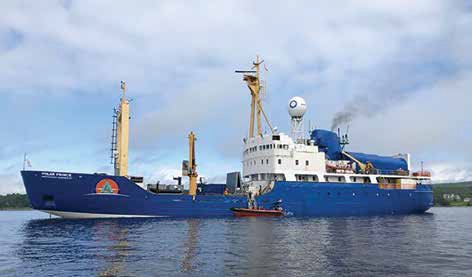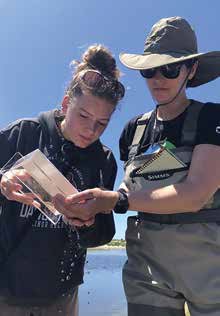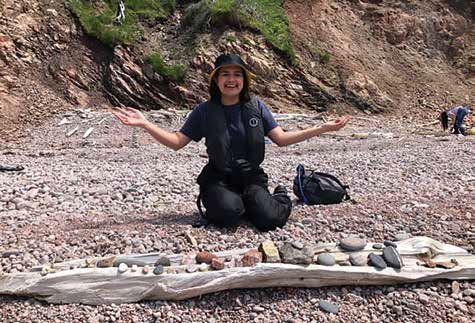Peter Croal
Old Ottawa East resident Peter Croal volunteered as an educator for 24
youth on a two-week-long voyage of discovery circling Sable Island and
Cape Breton. This is his story of the transformational experience.

The students and educators sailed on the Polar Prince, a “working ship” devoid of swimming pools, hot tubs and fancy dining rooms. As Peter Croal discovered, it is a ship designed for tough sea and ice conditions where all hands on deck pitched in to serve meals and clean the galley. Photo by Peter Croal
Have you ever heard the expression “Don’t let school get in the way of your education?” While formal teaching has a critical role in education, there are other forms of learning that can motivate, stimulate and engage young people in dynamic ways. One such method has been perfected over the last 23 years by the Gatineau-based and award-winning organization called Students on Ice Foundation (SOI), which places youth aged 14 to 24 on board a ship that will sail in any number of polar and maritime regions of the world.
Also onboard the SOI ship are volunteer educators, artists, musicians, Indigenous Elders and specialists who spend two weeks with the youngsters exploring a range of topics in a fluid and free-ranging way. SOI believes that youth have power in their voices and their actions to bring about positive change in the world. By connecting youth with the knowledge, people and resources that enable them to be part of the solution, SOI can succeed in helping build a future that benefits people and the planet.
During June of this year, I had the unique opportunity to serve with SOI as one of the 10 volunteer educators to help students with their discoveries, conversations and questions. Our route was the circumnavigation of Cape Breton and Sable Island that allowed us to explore and learn about proposed protected and conserved areas, National Parks, First Nations, National Wildlife Areas, Marine Protected Areas and a UNESCO Biosphere Reserve. The themes addressed on the voyage included climate change, biodiversity, ocean literacy, reconciliation, culture and conversation.

Working closely with educators helps students unlock the power to create positive global change. Photo by Peter Croal
My focus was on mining, geology and Indigenous issues. Our ship for this voyage of discovery was the Polar Prince, a small Indigenous-owned icebreaker belonging to the Miawpukek-Horizon Maritime Services. For two weeks, we all engaged in Etuaptmumk, otherwise called two-eyed seeing, to help show how we can incorporate culture and traditional knowledge into science and policy. This was particularly important on this voyage since, of the 24 youth on the expedition, 18 were First Nation, Métis and Inuit from small communities across Canada.
After meeting in Halifax at Dalhousie University, we had two days to get to know each other, enjoy ice breaker fun and review ship and Covid safety requirements. The excitement started to build when we boarded our bus to Musgrave where Polar Prince was docked, provisioned and ready to sail. Climbing the gangway with our gear, we all realized that the expedition was real, and that the ship would be our home and learning platform for two weeks. A sense of the unknown loomed, which added a sharp sense of wonder and excitement. When the crew shouted, “cast off the lines,” the powerful engines came to life and the ship slowly edged away from the wharf, leaving the small town of Musgrave to our stern. We knew this expedition had truly begun.
The Polar Prince is a “working ship.” It has no swimming pools, hot tubs or fancy dining rooms. Rather, it is a ship designed for tough sea and ice conditions, one where all available space is used for long sea voyages. For all of us aboard, youth and educators alike, it was necessary to pitch in to serve meals and clean up the galley. And we got to eat with and get to know the incredible crew of the Polar Prince. An ice breaker has a hull design that helps it roll when in the ice. As a result, the ship also rolls in rough seas – and there were several days when many of the students had not yet found their sea legs and were mildly seasick, but this soon passed for most.
Our journey was filled with experiences that will not be forgotten. We spent two days visiting Sable Island, passing time with Elders of the Eskasoni First Nation. We experienced wildlife sightings, including encounters with seals and puffins as we explored the shores of Bird Island, and we spent a day with descendants of Sir Alexander Graham Bell on their Cape Breton ancestral home.
The magic of SOI is that deep learning happens when questions are asked and curiosity is aroused while hiking, observing nature and wildlife, engaging with Elders or just gazing at the horizon from the ship’s rail. Perhaps it was July 1 that epitomized this form of learning. Since many of the students were Indigenous, most did not wish to celebrate Canada Day. Instead, we all gathered in the evening in the helicopter hanger at the back of the ship and had a wide-ranging conversation about residential schools and reconciliation. All the Indigenous youth were from families who had traumatic experiences from the residential school system. There were many tears, hugs and difficult stories shared in an atmosphere of respect and compassion. All non-Indigenous youth and staff came away with a more profound understanding of how residential school trauma can affect many generations.

Questions are asked and curiosity is aroused while hiking and observing the nature and wildlife of Cape Breton and Sable Island. Photo by Peter Croal
SOI participant Erica Jacque, of Postville, Newfoundland and Labrador, says it best: “SOI has opened up a whole new world of possibility, inspiration and curiosity in me that will be present in my life as long as I live”.
![]() Applications for the 2023 SOI expedition
Applications for the 2023 SOI expedition
season are now being accepted. Over 85% of successful applicants are fully funded through the generosity of SOI’s many partners. Should you wish to know more about SOI, please look at https://soifoundation.org/en/. Your son or daughter will be forever transformed







